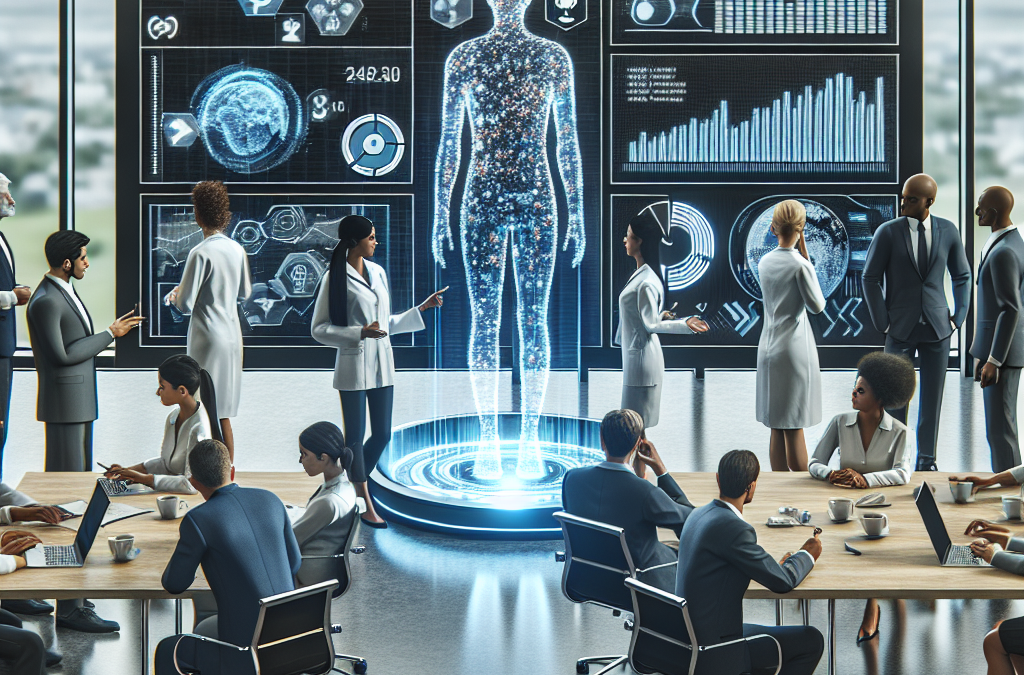The healthcare industry is continuously evolving, and the integration of cutting-edge technologies has become crucial for enhancing productivity, efficiency, and patient care. One such transformative technology is generative artificial intelligence (AI), which has the potential to revolutionize various aspects of healthcare operations. In this article, we’ll explore how generative AI-powered tools can significantly boost productivity, particularly within the healthcare industry.
Understanding Generative AI
Generative AI is a branch of artificial intelligence that focuses on creating new content, such as text, images, audio, or code, from scratch or based on existing data. Unlike traditional AI models that rely on predetermined rules or patterns, generative AI models use deep learning techniques to understand and generate content in a human-like manner. This capability opens up a wide range of applications across various industries, including healthcare.
Streamlining Administrative Tasks
One of the most significant challenges in the healthcare industry is the overwhelming administrative workload, which often diverts valuable time and resources away from patient care. Generative AI-powered tools can revolutionize administrative processes by automating tasks such as documentation, report generation, and data entry.
Automated Note-taking and Documentation
Medical professionals spend a significant amount of time documenting patient encounters, treatment plans, and progress notes. Generative AI models can transcribe and summarize these interactions in real-time, reducing the burden of manual note-taking and ensuring accurate and comprehensive documentation.
Report Generation
Generating reports is a time-consuming task that often requires synthesizing information from multiple sources. Generative AI tools can streamline this process by automatically generating reports based on patient data, test results, and treatment plans. These reports can be customized to meet specific requirements, ensuring consistency and reducing the risk of human error.
Enhancing Clinical Decision-Making
Generative AI can also play a pivotal role in enhancing clinical decision-making by providing valuable insights and recommendations based on vast amounts of medical data.
Clinical Decision Support Systems
Generative AI models can analyze patient data, medical literature, and treatment guidelines to provide personalized recommendations for diagnosis, treatment plans, and medication dosages. These AI-powered clinical decision support systems can assist healthcare professionals in making more informed and accurate decisions, ultimately improving patient outcomes. Again, these recommendations are not meant to replace the clinical staff, but rather offer options for the clinician to consider as part of their treatments.
Medical Research and Discovery
Generative AI can accelerate medical research and discovery by analyzing vast amounts of scientific literature, identifying patterns, and generating new hypotheses or insights. This can lead to faster breakthroughs in areas such as drug development, disease prevention, and personalized medicine.
Improving Patient Engagement and Education
Effective communication and patient education are essential components of quality healthcare. Generative AI tools can enhance patient engagement and education by creating personalized and accessible content tailored to individual needs and preferences.
Patient Education Materials
Generative AI models can generate customized patient education materials, such as brochures, handouts, or videos, that explain complex medical information in a clear and understandable manner. These materials can be tailored to the patient’s health literacy level, language, and cultural background, ensuring better comprehension and adherence to treatment plans.
Virtual Assistants and Chatbots
Generative AI-powered virtual assistants and chatbots can provide personalized support and guidance to patients, answering their questions, addressing concerns, and providing reminders for medication adherence or follow-up appointments. These AI-powered tools can be available 24/7, offering convenient access to healthcare information and support.
Optimizing Operational Efficiency
Beyond clinical applications, generative AI can also enhance operational efficiency in healthcare organizations by automating various administrative tasks and optimizing resource allocation.
Scheduling and Appointment Management
Generative AI models can streamline scheduling and appointment management by analyzing patient data, staff availability, and resource constraints. These AI-powered systems can optimize appointment scheduling, reducing wait times, and ensuring efficient resource utilization.
Supply Chain Management
Healthcare organizations often grapple with complex supply chain management challenges. Generative AI tools can analyze historical data, forecast demand, and optimize inventory levels, minimizing waste and ensuring the availability of critical supplies and equipment.
Ethical Considerations and Challenges
While the potential benefits of generative AI in healthcare are substantial, it is crucial to address ethical considerations and challenges associated with its implementation. These include:
Data Privacy and Security
Generative AI models rely on large datasets, which may include sensitive patient information. Ensuring data privacy and security is paramount to maintain patient trust and comply with regulations such as HIPPA, etc..
Bias and Fairness
AI models can perpetuate and amplify existing biases present in the training data. Addressing bias and ensuring fairness in AI-powered healthcare tools is essential to prevent discriminatory outcomes.
Transparency and Explainability
Generative AI models can be complex and opaque, making it challenging to understand their decision-making processes. Transparency and explainability are crucial for building trust and enabling healthcare professionals to interpret and validate AI-generated recommendations.
Regulatory Compliance
The integration of generative AI tools in healthcare must comply with relevant regulations and guidelines to ensure patient safety and the ethical use of these technologies.
Embracing the Future of Healthcare
As the healthcare industry continues to evolve, embracing generative AI-powered tools can significantly enhance productivity, efficiency, and patient care. By automating administrative tasks, supporting clinical decision-making, improving patient engagement, and optimizing operational processes, healthcare organizations can unlock new levels of productivity and focus more resources on delivering high-quality care.
However, it is essential to address ethical considerations and challenges, such as data privacy, bias, transparency, and regulatory compliance, to ensure the responsible and trustworthy deployment of these technologies. Collaboration between healthcare professionals, technologists, and policymakers is crucial to navigate these challenges and harness the full potential of generative AI in healthcare.
Keywords: Generative AI, Healthcare Productivity, Clinical Decision Support, Patient Education, Operational Efficiency, Administrative Automation, Data Privacy, Bias Mitigation, Transparency, Regulatory Compliance.


Recent Comments